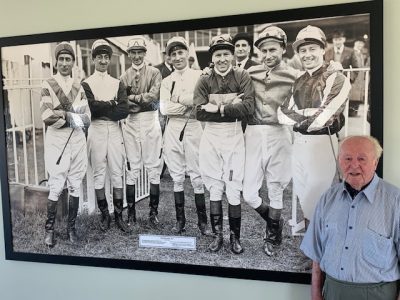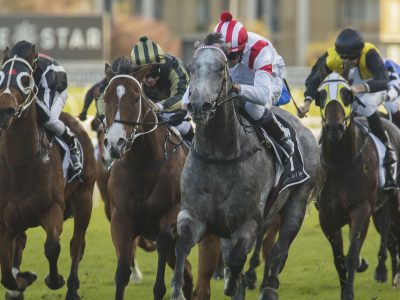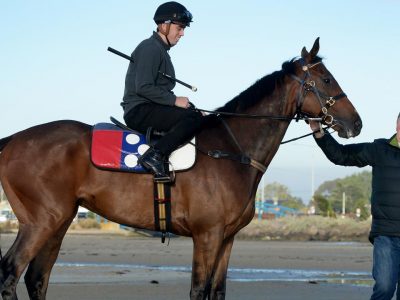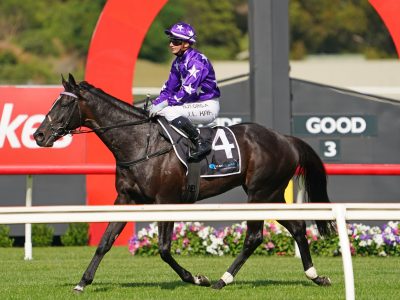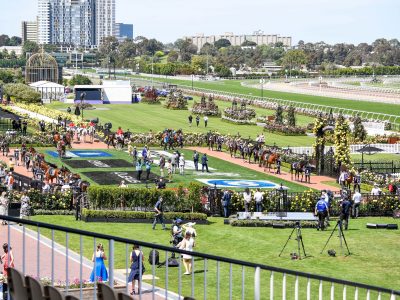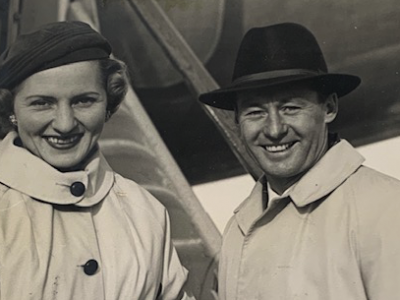
The Ron Hutchinson story and Aussies abroad (part 2)
Hutchinson heads to Ireland
Ron Hutchinson made his move to Ireland in 1960 and then England two years later – fundamentally lured by the money and inspired by Scobie Breasley.
“Firstly it was seven guineas (about £7 7s) a losing ride, from memory, and the prize–money was much better, in those days, than it was in Australia. We probably got paid double plus you had a retainer. Then we only got three quid (pounds) in Australia in the metropolitan area and £1 10s in the country.
“From memory we were racing for around £35 first prize in most races. There was no huge stake money in those days in Australia. I reckon training fees were around £5 a week.
“The retainer was probably more than I was earning here. It was quite a generous retainer in those days. Everything was paid for and I had a motor car and you’d get a percentage of the winner’s prize–money and, if you were lucky, they’d give you a present. Money wise it was much better,” he said.
Hutchinson’s career was on a high in Australia – he’d been champion jockey in Victoria the year before his move in 1960.
He’d been runner-up five times, behind either Bill Williamson or Jack Purtell, in the Melbourne jockeys’ premiership before his 1958-59 win (six winners clear of Geoff Lane).
“The press called us the big three, like Churchill, Roosevelt and Stalin,” he said.
The “big three have it their way” was the headline of a Melbourne Herald story in 1954. “Melbourne’s “big three” jockeys – W.Williamson, J. Purtell and R. Hutchinson – have won 146 races between them this season,” the report began.
In his first full year as a senior jockey in 1949-50, Hutchinson won the Coongy Handicap and the first of three Moonee Valley Cups on Hoyle in the spring and a second of four Australian Cups in the autumn.
His momentum continued thereafter with victories in the Newmarket Handicap, Futurity Stakes, Orr Stakes, Craiglee Stakes, Caulfield Stakes, Toorak Handicap, Mackinnon Stakes (2), Metropolitan Handicap, Adelaide Cup, George Adams – Cantala – (3), Brisbane Cup, Williamstown Cup, Hobart Cup (2), Launceston Cup, Queen’s Cup, VRC Sires Produce, VRC Oaks, Cox Stakes and Doomben Cup.
He also won countless country Cups including the prominent Bendigo, Ballarat, Mornington, Yarra Glen, Albury, Werribee, Kyneton, Warrnambool and Pakenham Cups.
He was on a high when he left for Ireland in 1960. He didn’t imagine he’d be away for the next 30 years.
“I was only going to go short term. I didn’t intend on staying there at all. In those days it was a dream to travel overseas and I’d never thought I’d be doing it. I was just taking the opportunity to see what the rest of the world was like. One season would have been enough for me. I was the leading rider in Melbourne the season before and I was doing all right here (Australia).
“If it didn’t go well I thought nevermind, I will have had the chance to see the world, and I’d have just come home,” he said.
As it turned out, things went very well and the decision to go to Ireland – rather than elsewhere which had been mooted – proved fruitful.
Although he had earlier declined an offer from Conyngham Lodge Classic winning trainer M.C. (Michael) Collins whose granddaughter Tracey Collins still trains from the site adjacent to the Curragh.
“I didn’t go then because I was just going too well at home and it was very early on in my career, the early 1950s from memory, and well before I actually went to Ireland,” he said.
That offer came in 1952 and The Age reported, on 12 February, that “Hutchinson was likely to accept the offer which had a retainer almost comparable with the highest yet made to an Australian jockey”. Nine days later The Age reported that Hutchinson had decided “opportunities in Melbourne will be more advantageous”.
“I’d also been offered a trip to go to India and I also had Eddie Arcaro and Johnny Longden talk to me about America,” he said.
Longden first came to Australia in the autumn of 1950. He rode in Melbourne and Sydney and won the All Aged Stakes at Randwick, at his first ride in Sydney and ninth in Australia, on The Groom. Newspapers reported he was “upset” at suggestions the race was “put on for him” – an allegation which George Moore said was “ridiculous”.
“I’d met Longden and Arcaro and another US jock named John Adams. I met quite a few riders from overseas when they rode in the Invitation Stakes (now the Rupert Clarke Stakes) at Caulfield.
“They used to invite overseas jockeys to come out to ride in it. Jack Reilly, the secretary of the Victoria Amateur Turf Club (now Melbourne Racing Club), set it up. He started those races where they’d invite a leading rider from other countries and sometimes I represented Australia.
“I got friendly with Longden and Arcaro. I spent a bit of time with him. They weren’t here for very long but they said I would do well over there (America),” Hutchinson said.
All three American jockeys were inducted into the USA Racing Hall of Fame.
“Longden asked me to go to America but I remember Tony Kennedy (The Age chief racing writer) wrote an article about me going there and Alan Bell, the chief steward, spoke to me and said ‘you don’t want to go to America. The mecca for all jockeys is to go to England. One day you might get a job to go there’. And sure enough I did,” he said.
Bell was a strong and persuasive character. It was said jockeys had to walk slow and think fast when Bell summoned them to the stewards’ room. “Oh yes,’ Hutchinson said, “all the jockeys used to shit themselves with Alan Bell. Had total control of the place.”
Hutchinson booked a trip to America, at Longden’s behest, in June 1950 when he was just 22 but shortly after cancelled the expedition and his international career was delayed for ten years.
“I went to Ireland first, went over to ride for Paddy Prendergast in 1960. Out of the blue I got a telegram at Flemington racecourse during Cup week to ring Paddy with a number to call which, of course, I did. I rang him and he offered me the job for the next season. He said he had some nice horses for the next season. He paid all my fares and gave me a retainer.
“Scobie, of course, was there before me and Paddy had Jack Thompson ride for him in the early 50s,” he said.
Thompson was champion jockey in Ireland in 1950 and won the Irish Derby, for Prendergast, on Dark Warrior.
“Paddy certainly knew of the Australian jockeys and he liked them. He was a jockey out here (Australia) himself.
“He was a jumps jockey out here old P.J. (Prendergast), but he didn’t do any good at all. He admitted that himself. Said he was hopeless. Didn’t do any good so he went back home. When he got back, Paddy told me he was broke, had no money at all, didn’t have the price of a pair of boots.
“Kevin Prendergast his son, who’s still training, was born in Australia and came back and worked at Randwick as a young bloke.
“Paddy went back to England, not Ireland, initially and he started work as a strapper at Epsom and gradually picked up a couple of horses to train himself which got him started.
“I was 32 when we left. We had two kids then, Raymond and Susan, but it was just my wife Norma and I who went over there and we left the two children with friends of ours who moved into our house and looked after them.
“It wasn’t our intention then to be gone all that long. I certainly wanted to be back before the end of the season over there as 1960 was the centenary year of the Melbourne Cup and I wanted to be back for the Cup.
“I had to be there in March for the opening meeting of the season on St Patrick’s Day and I got to Ireland in February. Paddy said it was OK for us to return in time for the Cup as his horses would be done here (Ireland) by then.
“We left in January. I’d never been outside Australia. We had a round the world ticket so I thought we might as well see as much of the world as we can because we won’t be doing this again. I’d been doing well in Melbourne so I wasn’t thinking of not coming back.
“So we set off, we went to Honolulu, San Francisco and Las Vegas, on to Chicago. We went all over America before I got to Ireland. It was all paid for so I was going to make the most of it. I’d only heard about things like the Empire State building, the biggest in the world and America was the place I was most excited about going to see.
“We had at least three weeks of travel, it was like a second honeymoon. Then we arrived in Ireland and Kevin (Prendergast) and a fellow called Pug McKenzie, a jumps jockey, met us at the airport in Dublin.
“They said ‘we’ll show you the Moonee Valley of Ireland’. Well, it was freezing cold with snow on the ground. Off we were taken to Ballydoyle which I thought was a shambles, out in the bush with a rickety running rail. I thought this is no bloody good.
“Anyway, we stayed in a little place called Naas, about 15 ks (kilometres) out of the Curragh. They put us up at Osberstown House, which was like an old mansion house or grand hotel, with rooms to let and they gave us a car,” he said.
Osberstown House, which sold for more than €2 million in 2019, was described as a three– storey over basement period house built c.1795, on 17 acres, with palatial ballroom, gym and wine cellar.
Hutchinson’s new employer Prendergast would win champion trainers’ titles in both Ireland and Britain, a feat only achieved since by the later maestros of Ballydoyle, Vincent O’Brien and Aidan O’Brien (no relation).
Aside from Thompson and Hutchinson, Prendergast also had Australians Williamson and Garnet Bougoure ride Classic winners for him.
“Every morning, I had to be at the stables at eight o’ clock. Paddy had about 40 horses in work, if I remember rightly; he was one of the leading trainers at the time.
“I became his stable rider. A fellow called Wally Swinburn was his jockey the previous season, he was the father of Walter, who rode Shergar.
“The Irish were very welcoming. They didn’t show me any animosity at all. They accepted me from the word go. I became mates with some of their good jockeys like Liam Ward and Paddy Powell. They’d take me out golfing. They never changed even when I had a bit of success,” he said.
Ward was six times champion jockey in Ireland between 1953 and 1961 – an era when Australian jockeys Thompson (1950), Bougoure (60) and Pat Glennon (62) al-so claimed that title. Powell was an Irish Derby winner who also rode successfully over the jumps.
“I didn’t enjoy riding out in the mornings. It was freezing. You could be out there on one horse for an hour and a half. If you had three lots the whole thing would take more than five hours. Wandering around with a string of horses on the beautiful mornings was lovely but you didn’t get upsides to have a chat. It was one in behind the others, colts in the front and the fillies at the back.
“We’d come in for breakfast around 9.30 and then go out again. In the meantime the strappers are getting the next lot ready. If you are not busy, not going to the races, then you’d go out again with the third lot. First week I was there I didn’t turn up for work on the Sunday, I thought – being a religious country – they’d all be at mass on the Sunday.
“Then on Monday morning, Paddy says first thing ‘where were you yesterday Hootch’ – that’s what he used to call me – and I said Norma and I went for a drive around Ireland. Sunday morning, I thought there’d be no work. He said ‘your contract says you have to ride seven days a week’.
“I was there from February to the end of October. Race riding maybe once or twice a week plus we’d get ready to take horses to England for the big meetings.
“It used to be so cold. I got there (Ireland) in February and it was freezing riding out most mornings at the Curragh. They used to have sheep on the course to keep the grass down. Think they still do.
“On the Sundays we’d take horses out for a walk around the roads. It was freezing and frosty and slippery. You’re riding these big strong horses and I used to get on to the grass but the other blokes would be telling me to get back on the road.
“They thought it was safer on the road because otherwise you were more likely to slip on the frost on the grass. You could easily go arse over head. Some of the horses would play up or pig-root so you had to be careful. It was hair raising.
“The winds were coming across from Siberia I reckon. It was an experience for me I can tell you. It was a real eye opener.
“I started off quietly, in the first month or so and just won a couple of little races around Ireland. But then things started to get going pretty well.
“I went to England and my first ride there was the 2,000 Guineas which I won on Martial for Paddy and we won the Irish 2,000 Guineas with Kythnos, plus a few races at the Chester meeting,” he said.
Trainer and jockey combined to win two of the Chester features – the Ormonde Stakes with Light Horseman and the Dee Stakes with Alcaeus.
“Then we took horses to Royal Ascot and we won the Coventry Stakes with Typhoon. I was on cloud nine, I couldn’t believe it. By June that year, Paddy asked If I would come back the next year and we did pretty well again. He was a great trainer of two-year-olds,” he said.
Alcaeus and Kythnos went on to finish second and third respectively behind St Paddy in the Derby.
“Paddy, in my first season in Ireland, had those two Derby horses. He would give them a stiff trial on the track leading into the Derby. He’d have a five furlongs horse who would go as fast as he could; the gallop would then be taken up by a horse who could go a mile and who would go as fast as he could. Then the two good horses would come home. I picked Kythnos because he won the trial. (Lester) Piggott won it (the Derby) on St Paddy and Scobie rode the second.
“The five furlong horse, you know, would go and win a race and the good miler would be very nearly a classic horse himself.
“The horses generally worked in a group which was a bit different to Australia. Later when I’d ride work for Harry Wragg, we’d go a mile, six horses together at Newmarket. The good ones settled at the back in Indian file, then the second horse would loom and then the third and so on. We’d finish the last 200 metres in a line. Each one would pick up the next. Finish together, if possible, on the bit,” he said.
Wragg had been a great jockey – a three time Derby winner – and like Hutchinson and Breasley was renowned for his patient, come from behind style, which earned him the nickname The Head Waiter.

